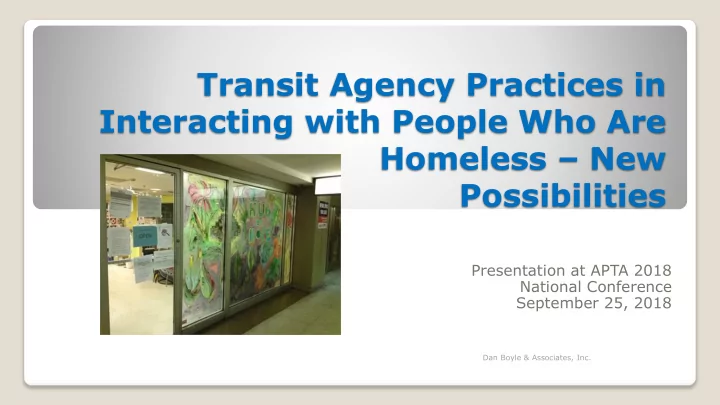

Transit Agency Practices in Interacting with People Who Are Homeless – New Possibilities Presentation at APTA 2018 National Conference September 25, 2018 Dan Boyle & Associates, Inc.
TCRP Syntheses (This is Synthesis 121) ➢ Snapshot in time ➢ How transit agencies are dealing with a specific issue
The Issue ➢ Individuals struggling with homelessness often utilize public transit vehicles or facilities as shelters from weather conditions and as safe places ➢ Transit agencies wish to preserve the quality of the transit environment
Why Is This Important? ➢ Many transit passengers are not comfortable in the presence of homeless persons ➢ This discomfort can discourage ridership ➢ This discomfort can also affect the image of transit
This Study ➢ Literature review ➢ On-line survey of transit agencies ➢ 55 completed surveys from 65 agencies in the sample ➢ Case examples
Findings from the Literature ➢ 40 years of studies ➢ Earlier studies: broader nature of homelessness and how transit facilities are especially affected ➢ More recent studies: successful strategies and programs involving partnerships
The Public Library Perspective ➢ Libraries and transit facilities: public and safe ➢ ALA guidelines on policies and procedures regarding user behavior (example on following slide) ➢ Need for even-handed enforcement
From Section 8.d of ALA Guidelines Policies and regulations that impose restrictions on library access should be based solely upon actual behavior and not upon arbitrary distinctions between individuals or classes of individuals. Policies should not target specific users or groups of users based upon an assumption or expectation that such users might engage in behaviors that could disrupt library service.
Trajectory of Transit Agency Responses and Activities Partnerships AND Enforcement Enforcement Riders are unhappy - do something! Not our problem
Extent to Which People Who Are Homeless Are an Issue for Transit Agencies by Agency Size
Case Example: Coffee with a Cop ➢ UTA Transit PD/Salt Lake City PD ➢ Intent: build trust between law enforcement and the community ➢ Engage individuals who are homeless in a non-crisis situation ➢ Coffee, doughnuts and discussion ➢ Personal hygiene items or socks preferred to doughnuts
Case Example: Multi-disciplinary forensic team (MDFT) ➢ BART PD as part of a voluntary Bay Area coalition ➢ Clinically trained outreach personnel work directly with police; DA’s office is also involved ➢ Establish rapport with at-risk populations through persistence ➢ Support system, collaboration, education, and training ➢ Reduced recidivism, incarceration and hospital visits for those individuals who have a history of multiple contacts
Case Example: Operation STOP ➢ City of Phoenix PD/Valley Metro ➢ Intent: address behavioral/code of conduct issues as well as gateway crimes AND connect individuals with social services ➢ Combines real penalties with inducements ➢ Closes the “revolving door” through broad partnerships ➢ Navigation model through the legal system
Case Example: Project HOME and Hub of Hope ➢ SEPTA PD and Project HOME ➢ Partnership established a walk-in engagement center (Hub of Hope) within SEPTA’s Suburban Station ➢ Benefits homeless persons, Project HOPE staff, and PD ➢ 359 individuals assisted within two months ➢ Reductions in homeless population within the transit system AND in customer complaints
Challenges ➢ Funding ➢ Inconsistency of collaborative efforts across municipal or county lines ➢ Recognizing a “reachable moment” ➢ Metrics to measure the success of various programs
How-to Matrix Suggested by Case Examples Question Approach How do I begin? Establish policies based on behavior Work with transit police (if existing) and local law enforcement to devise effective enforcement strategies with How do I enforce the the goal of ensuring and enhancing the safety and comfort of policies? all customers Real penalties are an important aspect of enforcement Experience suggests that inducements are needed along with Will enforcement alone penalties to make real changes in individuals’ behaviors. work? Partnerships with social service agencies and others can yield important benefits If you do not know where to begin, start with the local (city How do I find partners? or county) Human Services agency. Agency staff will direct you to agencies and provide contacts within those agencies. Funding is challenging for all parties, but partnerships help to share the cost. Seek out grant opportunities. Keep in mind How do I fund a program? that actions to address disruptive behavior are important to your customers and affect their perceptions of your agency. One agency noted that training “cultivates perceptions” at all Anything else? levels: agency personnel, law enforcement, customers, and the broader community.
Conclusions ➢ This is an issue for transit agencies ➢ Successful policies target behavior rather than groups of individuals ➢ Partnerships are essential ➢ Enforcement is necessary but not sufficient
Conclusions continued ➢ Transit agencies will never “solve” the problem of homelessness, even in partnerships ➢ Case examples demonstrate successful outcomes for individuals who are homeless and for transit agencies ➢ Agencies can (and deserve to!) acknowledge their role in these success stories
Postscript ➢ Customers may still be uncomfortable ➢ Programs may be already going on in your community: ➢ Religious groups ➢ Others
San Diego Episcopal Diocese • Interfaith program • Portable showers at a different church every week (usually Saturday morning) • Local hair salon offers free haircuts • Change of clothes/personal hygiene items • All volunteer effort
Lava Mae ➢ “Taking radical hospitality TM to the streets” to rekindle dignity and hope ➢ Convert public transportation buses into showers and toilets on wheels ➢ Open-source toolkit and platform on-line to help start similar programs elsewhere
Resources ➢ TCRP Synthesis 121: Transit Agency Practices in Interacting with Persons Who Are Homeless ➢ Available online at http://www.trb.org/Publications/Blurbs/174097.aspx ➢ dan@danboyleandassociates.com ➢ https://lavamae.org/
Recommend
More recommend